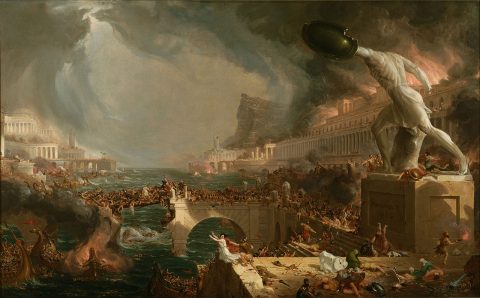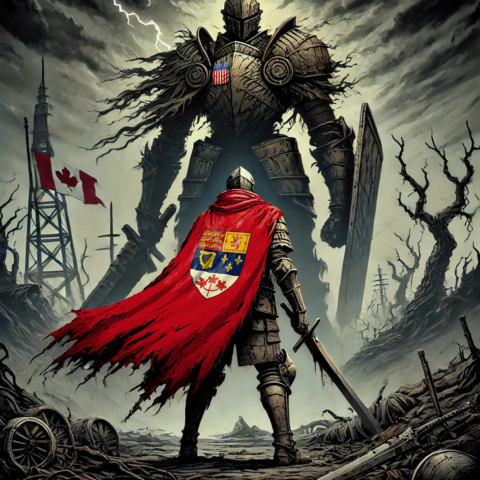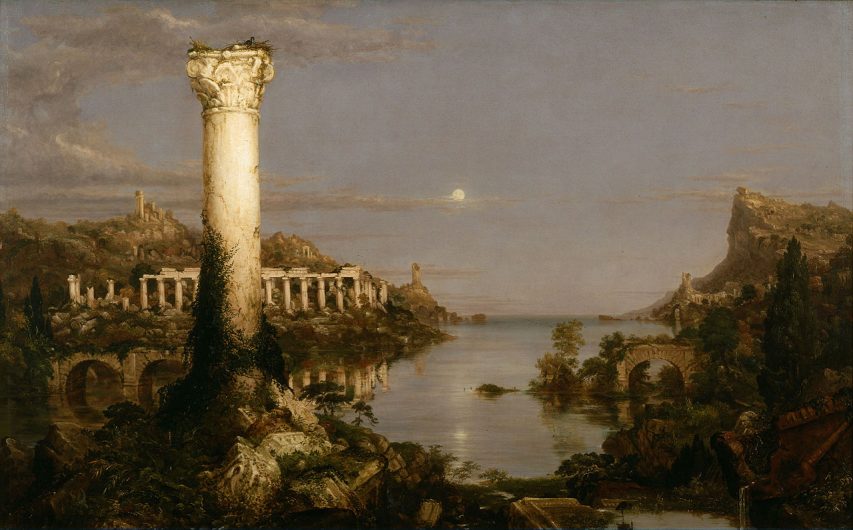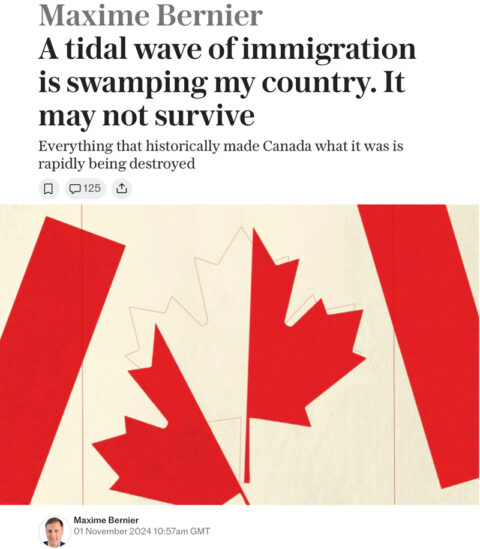Scenic Routes to the Past
Published Jul 19, 2024Tunisia’s Zaghouan Aqueduct, built to serve Carthage in the second century, is among the longest and most impressive of all Roman aqueducts. This video follows the aqueduct from the monumental fountain at its source to the grandiose baths at its terminus.
Historic tours with toldinstone: https://toldinstone.com/trips/
Check out my other channels, @toldinstone and @toldinstonefootnotes
November 14, 2024
Following the Longest Roman Aqueduct
QotD: The tragedy of the commons in North London
Despite this being North London we’re not talking about common people here and the tragedy of their entering the precincts of the progressives. Rather, the tragedy of common resources.
One fact about those bathing ponds on the Heath:
Honesty boxes for bathers to pay to swim were introduced in 2005. There were plans for a compulsory charge in 2012, but they came to nothing.
We have open access to a resource, Marxian access. We also have one other fact:
It was once a well-kept secret. Now the bathing ponds on Hampstead Heath are among the most crowded parts of London on a hot summer’s day.
We have – by one measure at least – excessive use of that resource, use that needs to be limited in some manner.
This is a problem that has been noted before, it’s called the Tragedy of the Commons. As Garrett Hardin points out there are only two ways of restricting such access, capitalist – charge for it – or socialist – regulate.
The third option, Elinor Ostrom’s, does not work with this number of people. That communal agreement tops out at about 3,000 peeps, not 10 million.
Which of the two solutions works depends upon the specific circumstance and isn’t the point to be made here. Rather, the lesson to learn is that Marxian access just doesn’t work when demand is at or above capacity. A useful thing to think about when contemplating other areas of the economy.
Tim Worstall, “Hampstead Heath Ponds And The Tragedy Of The Commons”, Continental Telegraph, 2020-01-19.
November 13, 2024
Ah, the lovely Welsh countryside, where everything is … racist?
Andrew Doyle digs into the claim that the Welsh government recently made that “racism relating to climate change, environment, and rural affairs” is oppressing visible minorities in the principality and preventing them from accessing the countryside:
The Welsh government believes that the countryside presents a problem for ethnic minorities. Its latest report on “racism relating to climate change, environment, and rural affairs” concludes that certain racial groups “face barriers created by exclusions and racism preventing them from fully participating in ‘environmental’ activities”. In response, the Welsh Conservative leader Andrew R. T. Davies has told a reporter from Guido Fawkes: “This kind of outdated virtue signalling nonsense is completely out of touch with the needs of the people of Wales. Labour is stuck on yesterday’s thinking, the kind that is being roundly rejected globally. Time to turf them out.”
The horticultural pun is forgivable given the sheer magnitude of the absurdity. While we might dismiss this as the usual brain-addled antics of the Welsh government, it’s just the latest example of a trend that has been ongoing for years. In September 2020, an article appeared in the Metro claiming that the countryside was “shaped by colonialism” and therefore is “unwelcoming to people of colour”.
Apparently, the illustration of three white people scowling at a black woman while standing in a meadow is proof of the article’s central thesis. I may as well sketch a shiny goblet and claim it as evidence that I’ve found the Holy Grail.
[…]
All of these examples are ostensibly frivolous and easy to dismiss as yet more “woke gone mad” news items, but there are other sinister aspects to consider. For instance, I was able to discover the reason why Kew Gardens went along with this ideological bilge by reading its Equality, Diversity and Inclusion Delivery Plan. One of Kew’s EDI “strategy pillars” includes the seeking of accreditation by outside activist groups including Stonewall. Like many public bodies, ideas are implements in the workplace in return for points on schemes like Stonewall’s Workplace Equality Index.
And this has serious ramifications. You might remember when the Times uncovered documents revealing that Stonewall has attempted to control what NHS trusts, government departments and local councils say on their social media accounts, demanding public support for its views on gender identity ideology, and then rewarding them with points towards its Top 100 Employers index. This means that if a government department uses the term “birthing parent” instead of “mother” they are able to advance in the scheme. It’s quite the racket.
Worse still, 10% of the Scottish government’s score on the index was relating to consultation with Stonewall on revising legislation. In other words, for a while there it was looking very much as though the SNP were using taxpayers’ money to fund a lobbying group that would in turn reward the government for changing the law according to their ideology.
The Welsh government is one of the worst offenders when it comes to pushing gender identity ideology onto children and working at the behest of identitarian activists. A Freedom of Information request in 2023 revealed that “Stonewall Cymru was directly funded by Welsh Government in the sum of £100,000 for the financial year requested”. (The full details can be accessed here.) I am not alleging that the latest drive to “problematise” the countryside is being directed by activist groups for financial gain, but it does suggest a certain susceptibility when it comes to this kind of ideological mania.
So when the Welsh government and other institutions insist that the countryside is racist, or that chrysanthemums are homophobic, or that badgers hate Sikhs, or whatever the current delusion might be, we shouldn’t just laugh it off. These are just the latest and silliest symptoms of a much deeper cultural malaise. This is an illiberal and regressive ideological movement masquerading as liberal and progressive, and it has ways of asserting its power.
Let’s face it, if they can convince you that the countryside is a domain of heteronormative white supremacy, they can convince you of anything.
The Korean War Week 21 – US Elections Threaten MacArthur! – November 12, 1950
The Korean War by Indy Neidell
Published 12 Nov 2024MacArthur’s forces struggle to make sense of the recent Communist Chinese intervention in Korea, especially when the Chinese vanish as quickly as they arrived. Back in the US, the war’s popularity has reached an all-time low on the eve of the crucial 1950 midterm elections. Is MacArthur about to pay the price for his failure to deliver results on the ground?
Chapters
00:00 Intro
01:01 Recap
01:24 The Chinese Vanish
02:37 The East
04:35 The US Situation
11:28 Bombing the Yalu
13:03 Summary
13:23 Conclusion
14:26 CTA
(more…)
Anglo-German Dreadnought Arms Race – Anything you can build I can build better!
Drachinifel
Published Nov 17, 2021Today we take a whistlestop tour behind the driving forces and outcome of the Anglo-German Naval Arms Race that led up to WW1.
QotD: The 1990s
Remember The Matrix? It spawned a zillion pop-academic books with titles like The Matrix and Philosophy, and for once it wasn’t just a marketing gimmick. I doubt the filmmakers intended this — given that at least one of the Wachowski Brothers is now a trannie, I suppose their intended message was “let your freak flag fly, because that makes you Secret Jesus” — but all that Baudrillard stuff that inevitably attaches itself to a movie about virtual reality was actually kinda true.
Consider that if we really do live in a computer simulation, then everything the #wokesters are always going on about is actually true. Everything really IS a “social construction”, because “society” was literally constructed. All that stuff about “systemic racism” is true, too, because again, we’re dealing with a design. Nothing evolves organically inside The Matrix, because there’s nothing organic in there at all. It’s ALL on purpose …
… and you, #wokester, are the only one who can see it. Unlike Karl Marx, who was able to see beyond his class situation enough to say that no one can see beyond his class situation, because reasons, you, #wokester, can do it because you’re Neo. That, too, is built into the system. It’s an endless recursion … but one that entails that you, and you alone, are special, on purpose.
That, kameraden, was the 1990s. Even those movies our author mentioned — Beverly Hills Cop III, Lethal Weapons 3 and 4 — weren’t just copies of copies, they were ironic, snarky commentaries on copies of copies. See also Scream, which was a “deconstruction” of every slasher picture ever made. If you can’t beat ’em, join ’em … but since both beating ’em and joining ’em entail making a sincere effort and sincerity is forbidden, all you can do is mock ’em. That’s what “deconstruction” is, one long polysyllabic mockery of the very idea of excellence. It’s the perfect philosophy for people who know themselves to be mediocre but have been told from day one that they’re special.
See also the tv show Friends, where five ludicrously attractive people and David Schwimmer all pretend to be just normal folks (who happen to live in 3,000 square foot apartments in Manhattan) — each episode is “the one that’s just like The Brady Bunch, but snarky”. Or Seinfeld, which was deliberately designed to be a grating mockery of stuff like The Odd Couple. All snarky mockeries of the very concept of sincerity.
See what I mean? That’s normal now, which is why the 90s must be dragged into an alley and shot, for Western Civ’s sake.
Severian, “Why the 90s Was the Worst Decade Ever”, Rotten Chestnuts, 2021-07-04.
November 12, 2024
John Carter – “We can all sense the vibe shift”
At Postcards From Barsoom, John Carter tries to explain the “vibe shift” in western culture:

The Course of Empire – Destruction by Thomas Cole, 1836.
From the New York Historical Society collection via Wikimedia Commons.
Underneath the medical tyranny of COVID, the stolen elections, the Internet censorship, the inflation, the hypermigration, the gender psychosis, the polarized rancor of sexual politics, and all of the rest of the symptoms of our decaying mismanagerial order, a countercurrent has flowed through the deep and hidden places of our collective psyche, hot and slow, like a chthonic river of magma rising implacably to the surface.
It isn’t just frustration with the intolerable imposition of Woke into every aspect of our lives, as though we could reset the clock to 90s liberalism and get fresh again with the Prince of Bel Air. It isn’t just anger at the invasion of our countries by the third world, nor is it limited to impatient disgust with the glossolalic babble of an incompetocracy comprised of credentialed midwits who seem to feel that word-shaped noises confer all the legitimacy they need to misrule our countries into oblivion.
It isn’t purely negative.
There’s a sense, somehow, of hope.
Hope, that after decades in which it seemed that history has stalled, that the culture has been frozen in permafrost, that nothing new could ever really be done again, that Nothing Ever Happens, that the only thing we can look forward to is a long, cold decline into technocratic surveillance, demographic implosion, green energy poverty, and final, irrecoverable collapse … hope that maybe this insipid fate isn’t so inevitable as we thought. Hope, that the building tectonic pressure of those buried psychological forces might finally break through and crack the shell of a dead future.
The sudden birth of artificial intelligence and the renewed enthusiasm for the conquest of space are two very obvious signs of this abrupt return of novelty. This is not a purely positive thing – AI is regarded with anxiety by almost everyone, but it is the raw fact of its sudden transition from science fiction to mundane tool of everyday life that is significant here.
There are other signs of this sense of renewal. The proliferation of self-improvement culture amongst many of the youth, particularly on the Very Online Right. The rise of the digital nomad, a modern re-enactment of the Romantic wanderjahr. The quiet birth of the network state, for instance in the form of Praxis. The renaissance of thoughtful, long-form essays right here on Substack. Surging interest in the religious traditions of our ancestors, whether in the form of Orthodox Christianity or paganism. The transformation of warfare by drones, promising a revolution in military affairs every bit as epochal as the firearm. The rise of a contradictorily global sense of national particularism. The steady refinement of 3D printing technologies.
Trump’s victory in 2024 seems a sure sign of this vibe shift. In a plot arc that could have been lifted straight from the original Star Wars trilogy, Trump brought A New Hope to America – and the world – in 2016; his forces were shattered and scattered to the winds in 2020 when The Empire Struck Back; only for the rebel forces, tempered by the lessons learned in defeat and strengthened with the assistance of new allies, to Return With the Jedi in 2024 and once again blow up the Death Star. This time around, Trump represents not simply the desperate holding action of an underground resistance to granny state totalitarianism, but the coalescence of a new and vigorous counter-elite, as embodied most of all by the ambitious hectobillionaire space lord who built auctoritas by buying the digital public square out from under the Empire so he could shitpoast in peace with the chuds.
Each of these has their good and bad aspects – the point, again, is not to dwell on whether any given development will be to our benefit or our detriment. As always, the ramification of second and third-order effects through the social order will result in both advantage and disadvantage. The point is simply that things are changing, that we can all feel it, and that this fuels a sense of nervous excitement that permeates the atmosphere like electrical buzz of a high-tension wire. Perhaps there will be disaster, and we shall drive ourselves to ruin and extinction; perhaps our descendants will walk the stars as near-gods. Either way, we are here, now, at this most interesting of nexus points in the unfolding history of our species. Would you rather be anywhen else?
The pessimism of recent years naturally generated an interest in cyclical theories of history – the empirical Strauss-Howe model of generational turnings, Turchin’s mechanical cliodynamics with its elite overproduction and wealth pumps, Spengler’s mythopoetic conception of cultures as vast organisms whose lifecycles progress through predictable seasons. Hard times make strong men; strong men make good times; good times make weak men; weak men make hard times. Whichever model one favours, the invariable conclusion is that Western civilization is in its terminal winter – fragile, ossified, decadent, corrupt, exhausted, and doomed. Desolation awaits.
“The Course of Empire – Desolation” by Thomas Cole, one of a series of five paintings created between 1833 and 1836.
Wikimedia Commons.Yet a cycle is not defined by its final product, no more than a symphony is defined by its concluding note, a life by its last moment, a wheel by a single turn, or a circle by a single point. Viewed from another angle, the death of Faustian civilization is also the birth of a new civilization … and even as we are here to live through the death of one, we plant the seeds for the other. With the tempo of history moving faster than ever before due to the global interconnectivity of instantaneous telecommunications and high-speed travel, it may be that our children will live in the savage springtime of that new civilization … perhaps one animated by the Aenean rather than the Faustian soul, which “will go Mars, not because it is hard, but because it is necessary”. You should read the essay at that last link, by the way. It isn’t long, it’s extremely interesting, and it’s new.
“Nice business ya got there, Patreon. Wouldn’t want anything to happen to it …”
Above the paywall, Ted Gioia discusses Apple’s latest attempt to cut itself a nice big middleman’s slice of the indy creator market by putting the thumbscrews to Patreon:
Can Apple really charge a 30% tax on indie creators?
What Apple is now doing to indie creators is pure evil — but this story has received very little coverage. Journalists should pay attention, because they are under threat themselves.
Apple is now putting the squeeze on Patreon, a platform that supports more than a quarter of a million creators — artists, writers, musicians, podcasters, videographers, etc.
These freelancers rely on the support of more than 8 million patrons through Patreon, which charges a small 8-12% fee. Many of these supporters pay via Patreon’s iPhone app.
Earlier this year, Apple insisted that Patreon must pay them a 30% commission on all new subscriptions made with the app. In other words, Apple wants to take away close to a third of the income for indie creators — almost quadrupling their transaction fees.
This is the new business model from Cupertino, and it feels like a Mafia shakedown. Apple will make more from Patreon than Patreon does itself.
The only way for indies to avoid this surcharge is by convincing supporters to pay in some other way, and not use an iPhone or Apple tablet.
This is what happens when Apple decides to treat a transaction as an “in app payment” — as if an artist’s entire vocation is no different than a make-believe token in a fantasy video game.
But you can easily imagine how almost anything you do with your phone could be subject to similar demands.
I’ve been very critical of Apple in recent months. But this is the most shameful thing they have ever done to the creative community. A company that once bragged how it supported artistry now actively works to punish it.
Canada in the news … for all the wrong reasons
In the National Post, Tristin Hopper explains why your non-Canadian friends may be finding their opinions on the dysfunctional Dominion getting more and more sour in recent years:
… within just the last few years, multiple foreign outlets have profiled Canada for the singular purpose of asking what happened to it, and worrying if Canada’s ills will soon be their own. What’s more, these articles are not limited to a single topic; so much is going sideways in Canada right now that everything from our assisted-suicide regime to our economy to our internet legislation is attracting overseas notice like never before.
Below, a cursory guide to some of them. If you’re noticing that your non-Canadian friends suddenly have a darker picture of your home country than they used to, here’s a clue as to why.
“Justin Trudeau is killing Canada’s liberal dream”
Ever since the 2019 federal election, The Economist‘s coverage of Prime Minister Justin Trudeau has usually followed a general theme of noting that the bloom is off the rose of his photogenic ascendancy to power in 2015. But in a trio of articles published last month, the publication laid into the Canadian leader as an icon of what not to do.
Justin Trudeau is killing Canada’s liberal dream, published on Oct. 14. Canada’s Trudeau trap, published on Oct. 17. And then, just for good measure, Justin Trudeau is paying for solar panels in the cold, dark Arctic.
[…]
“Canada Is Disintegrating”
The Telegraph in the U.K. ran an entire series of essays last week on the topic of Canada taking it to the limit on progressive laws covering everything from drugs to national identity.
[…]
“Canada’s Extremist Attack on Free Speech”
The June tabling of the Online Harms Act prompted a wave of foreign coverage unlike few pieces of Canadian legislation. Although virtually every non-U.S. country has legislated controls on extreme speech, the Online Harms Act went noticeably farther than its peer countries in two respects: It prescribes a life sentence for the speech crime of “advocating or promoting genocide”, and it authorizes pre-emptive custody for anyone suspected of committing hate speech in future.
Type 92 Japanese HMG
Forgotten Weapons
Published Mar 9, 2015The Type 92 was the final iteration of a machine gun that began as the Model 1897 Hotchkiss HMG made in France. The Japanese army purchased many of these guns, and then produced their own slightly refined version. These in turn were replaced by the updated Type 3 (1914) heavy machine gun, and finally the Type 92 (1932). A lightened upgrade to the Type 92 was prototyped (the Type 1, 1941), but never went into production. Mechanically, the Type 92 is very much like a scaled-up Type 11 light machine gun, using 30-round strips to feed. Despite being generally derided today, these machine guns were very reliable, accurate, and effective. This particular one happens to have a 7mm Mauser barrel in it, from a South American contract.
http://www.forgottenweapons.com
Theme music by Dylan Benson – http://dbproductioncompany.webs.com
QotD: Roger Scruton, terroiriste
 >Good wine is a “somewhere”, not an “anywhere”. It is stamped with a place and a year. Rooted, literally. The fancy French word for this is terroir, referring to the way in which environment — soil, geology, even the history of a place — is all responsible for a wine’s character. Terroir is a sense of place in a glass. Roger Scruton often referred to himself as a “terroiriste“. And this could describe his political philosophy as much as his philosophy of wine. From 2001 to 2009, Scruton wrote a wine column in the New Statesman, enabling him to smuggle into that otherwise exclusively Left-wing journal, all sorts of reactionary political ideas: about God, about fox-hunting, about beauty, about his love of the countryside.
>Good wine is a “somewhere”, not an “anywhere”. It is stamped with a place and a year. Rooted, literally. The fancy French word for this is terroir, referring to the way in which environment — soil, geology, even the history of a place — is all responsible for a wine’s character. Terroir is a sense of place in a glass. Roger Scruton often referred to himself as a “terroiriste“. And this could describe his political philosophy as much as his philosophy of wine. From 2001 to 2009, Scruton wrote a wine column in the New Statesman, enabling him to smuggle into that otherwise exclusively Left-wing journal, all sorts of reactionary political ideas: about God, about fox-hunting, about beauty, about his love of the countryside.
Wine, for Scruton, was never just about the taste, never a merely aesthetic sensation. Indeed, he was extremely sniffy about all those “blind tastings” — the ones where we delight when an expert fails to spot the difference between plonk and Premiere Cru. They miss the point, says Scruton. Blind tasting, he explained, is like blind kissing — not a good way to distinguish, for example, between someone who is sexy and someone who is not. Indeed, if the experiment on Love Island is anything to go by, it’s not even a good way to distinguish who your own girlfriend is.
That’s because sexual chemistry, like wine, is a great deal more than some momentary sensation on the lips. It’s a great deal more than a message sent by taste receptors to the brain. It is all about the terroir. And this is not just a comment about wine but about aesthetic experience in general. When we encounter a work of art, we bring a whole hinterland of knowledge that makes sense of that specific experience and gives it its character as art. Music is more than a vibration of the air and its reception by the ear and the brain. So too with wine and taste.
Giles Fraser, “Raise your glass to Roger Scruton, the terroiriste“, UnHerd, 2020-01-15.
November 11, 2024
In memoriam
A simple recognition of some of our family members who served in the First and Second World Wars:
The Great War
 Private William Penman, Scots Guards, died 16 May, 1915 at Le Touret, age 25
Private William Penman, Scots Guards, died 16 May, 1915 at Le Touret, age 25
(Elizabeth’s great uncle)- Private Archibald Turner Mulholland, Argyll & Sutherland Highlanders, mortally wounded 25 September, 1915 at Loos, age 27
(Elizabeth’s great uncle) - Private David Buller, Highland Light Infantry, died 21 October, 1915 at Loos, age 35
(Elizabeth’s great grandfather) - Private Harold Edgar Brand, East Yorkshire Regiment. died 4 June, 1917 at Tournai.
(My first cousin, three times removed) - Private Walter Porteous, Durham Light Infantry, died 4 October, 1917 at Passchendaele, age 18
(my great uncle, who had married the day before he left for the front and never returned) - Corporal John Mulholland, Argyll & Sutherland Highlanders, wounded 2 September, 1914 (shortly before the First Battle of the Aisne), wounded again 29 June, 1918, lived through the war.
(Elizabeth’s great uncle) - John Eleazar (“Ellar”) Thornton, (ranks and dates of service unknown, served in the Royal Garrison Artillery, the East Surrey Regiment, and the Essex Regiment (dates of service unknown, but he likely joined the RGA in 1899). Put on the “Z” list after the war — recall list. He died in an asylum in 1943.
(my grandfather’s eldest brother) - Henry (Harry) Thornton, (uncertain) Lancashire Fusiliers. (We are not sure it is him as there were no identifying family or birth date listed. Rejected for further service.)
(my grandfather’s second older brother)
The Second World War
- Flying Officer Richard Porteous, Royal Air Force, survived the defeat in Malaya, was evacuated to India and lived through the war.
(my great uncle) - Able Seaman John Penman, Royal Navy, served in the Defensively Equipped Merchant fleet on the Atlantic convoys, the Murmansk Run (we know he spent a winter in Russia at some point during the war) and other convoy routes, was involved in firefighting and rescue efforts during the Bombay Docks explosion in 1944, lived through the war.
(Elizabeth’s father. We received his Arctic Star medal in July, 2024.) - Private Archie Black (commissioned after the war and retired as a Major), Gordon Highlanders, captured during the fall of Singapore (aged 15) and survived a Japanese POW camp (he had begun to write an autobiography shortly before he died)
(Elizabeth’s uncle) - Elizabeth Buller, “Lumberjill” in the Women’s Timber Corps, an offshoot of the Women’s Land Army in Scotland through the war.
(Elizabeth’s mother) - Trooper Leslie Taplan Russon, 3rd Royal Tank Regiment, died at Tobruk, 19 December, 1942 (aged 23).
Leslie was my father’s first cousin, once removed (and therefore my first cousin, twice removed). - Reginald Thornton, rank and branch of service unknown, hospitalized during the war with shellshock and was never discharged back into civilian life. He died in York in 1986.
(my grandfather’s youngest brother)
My maternal grandfather, Matthew Kendrew Thornton, was in a reserved occupation during the war as a plater working at Smith’s Docks in Middlesbrough. The original design for the famous Flower-class corvettes came from Smith’s Docks and 16 of the 196 built in the UK during the war (more were built in Canada). My great-grandmother was an enthusiastic ARP warden through the war (she reportedly enjoyed enforcing blackout compliance in the neighbourhood using the rattle and whistle that came with the job).
For the curious, the Commonwealth War Graves Commission the Royal British Legion, and the Library and Archives Canada WW1 and WW2 records site provide search engines you can use to look up your family name. The RBL’s Every One Remembered site shows you everyone who died in the Great War in British or Empire service (Canadians, Australians, New Zealanders, South Africans and other Imperial countries). The CWGC site also includes those who died in the Second World War. Library and Archives Canada allows searches of the Canadian Expeditionary Force and the Royal Newfoundland Regiment for all who served during WW1, and including those who volunteered for the CEF but were not accepted.
In Flanders fields the poppies blow
Between the crosses row on row,
That mark our place; and in the sky
The larks, still bravely singing, fly
Scarce heard amid the guns below.We are the Dead. Short days ago
We lived, felt dawn, saw sunset glow,
Loved and were loved, and now we lie
In Flanders fields.Take up our quarrel with the foe:
To you from failing hands we throw
The torch; be yours to hold it high.
If ye break faith with us who die
We shall not sleep, though poppies grow
In Flanders fields.Lieutenant Colonel John McCrae, MD Canadian Army Medical Corps (1872-1918)
Here is Mark Knopfler’s wonderful song “Remembrance Day” from his Get Lucky album, set to a slideshow of British and Canadian images from World War I through to more recent conflicts put together by Bob Oldfield:
The Angel of Victory: Canada’s Processing of The Great War (Vancouver, BC)
Valour Canada
Published Jan 9, 2024This video, by Hania Templeton, discusses the historical context, significance, and current meaning of The Angel of Victory in Vancouver, BC. Hania’s work received first place in Valour Canada’s 2023 History & Heritage Scholarship (VCHHS) contest.
To learn more about this annually awarded #scholarship, including the rules and regulations for eligible entrants, please visit https://valourcanada.ca/education/vch…
QotD: Military glamour
From Achilles, David, and Alexander through knights, samurai, admirals, and airmen, warriors have been icons of masculine glamour, exemplifying courage, prowess, and patriotic significance. Military glamour endures to this day in the iconography of recruiting ads, with their depictions of swift, decisive action, enduring camaraderie, perfect coordination, and meaningful exertion.
In the 19th century, warfare was one of the first contexts in which English speakers used the term glamour in its modern metaphorical sense. (The word originally meant a literal magic spell that made people see things that weren’t there.) “Military heroes who give up their lives in the flush and excitement and glamour of battle”, opined a U.S. congressman in 1885, “are sustained in the discharge of duty by the rush and conflict of physical forces, the hope of earthly glory and renown”.
Even people who hated military life could feel the attraction. Writing after the briefest of conscriptions (a single night in the barracks), D.H. Lawrence in 1916 lamented “this terrible glamour of camaraderie, which is the glamour of Homer and of all militarism”.
The slaughter and apparent futility of the Great War changed all that. Peace activists and bitter veterans now saw the “glamour of battle” as a dangerous delusion rather than a valuable inspiration. “Are you going to tell your children the truth about what you endured,” an American challenged fellow veterans in 1921, “or gild your reminiscences with glamour that will make them want to have a merry war experience of their own?” In 1919, the British painter Paul Nash wrote that the purpose of The Menin Road, his bleak portrait of a desolate and blasted landscape, was “to rob war of the last shred of glory, the last shine of glamour.”
Virginia Postrel, “Casualty of War”, Virginia’s Newsletter, 2023-08-10.








